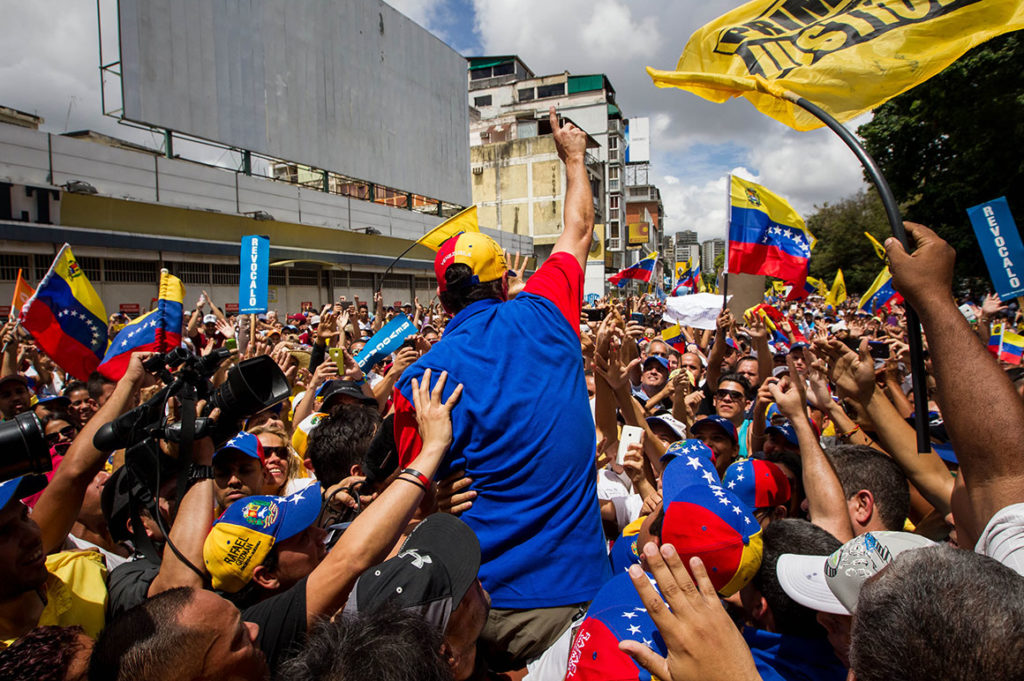In its Feb. 28 edition, The Collegian published an op-ed titled, “Venezuela: A country at the peak of history,” written by Juan Hernandez. The essay contains blatant falsehoods and many more decontextualized assertions that make clear Hernandez’s anti-Maduro bias and failure to carefully evaluate information.
According to Hernandez, “it’s no secret” that Venezuela represents one of the “last bastions” fraught with “socialist ideas.” Later, he wrote, “The hoax of a socialist paradise has been, at last, unmasked.”
Maybe it’s a secret to him, but Venezuela’s economy functions far from a “socialist paradise.” According to The Heritage Foundation, Venezuela’s “overall tax burden equals 14.9 percent of total domestic income.” The overall tax burden in the United States is 26 percent of its total domestic income.
Similarly, only 18 percent of Venezuela’s labor force works in the public sector, compared to 14 percent in the U.S., 22 percent in France, and 29 percent in Norway. Venezuela’s economy is mostly private, with a similar public-private distribution to that of Canada and the United Kingdom.
Hernandez’s most egregious error appeared when he characterized a dispute over trucks belonging to the U.S. Agency for International Development attempting to cross from Colombia into Venezuela.
“The ongoing humanitarian crisis in Venezuela led to a massive response from the international community,” Hernandez wrote.
This is true: The international community, including Russia, China, Cuba, and the International Red Cross, continue to help Venezuela at different points during its economic crisis. The U.S., on the other hand, only offered “aid” once it announced in January that it would back Juan Guaido, the leader of the legislature, as the president of Venezuela.
Unsurprisingly, President Nicolas Maduro’s administration denied the aid, citing concerns that the aid was not offered in good faith, but rather only for political reasons. The Red Cross agreed with Maduro, saying they wouldn’t participate in aid with political motives.
Finally, journalists and officials also expressed the possibility that USAID could contain weapon shipments for Venezuelan opposition gangs, which graduated from violent protests a few years ago to attempted assassinations of the president last year.
Sounds crazy, right? Think again. USAID was caught in 1987 secretly shipping $27 million worth of weapons to the Contras, even after the group had committed mass atrocities throughout Nicaragua. The shipment was spearheaded by then-Assistant Secretary of State Elliott Abrams; Abrams was appointed by President Donald Trump in January to lead the USAID envoy to Venezuela. Hernandez failed to mention any of this.
Even worse, Hernandez recited a fake report — the most credible version of which exists on Sen. Marco Rubio’s Twitter feed — about the confrontation between Venezuelan border security and the masked youths escorting USAID trucks from Colombia.
“As the trucks crossed the border, two of them were burned down by the Venezuelan dictatorial armed forces,” Hernandez wrote. It’s hard to pin down the origin of this allegation because it’s false.
Two of the trucks did burn, but had Hernandez cared to check anywhere besides the U.S. state department, he would have found a video of a masked youth, while escorting the trucks that never did cross the border, throw a molotov which landed too far from the border security and too close to the USAID. Within minutes, the trucks became engulfed in flames, and the narrative fell into place: “Genocidal dictator” Maduro strikes again.
In Hernandez’s defense, the New York Times reported this story a few weeks after the fact. But the video was available the day of the incident, and it was even reported the day after by non-mainstream investigative outlets.
Since the USAID fiasco, Rubio has made a few other false allegations via Twitter, including a claim that 80 neonatal babies died in a Venezuelan hospital due to a blackout (the hospital has since confirmed no such thing occurred).
While it’s difficult to know what’s happening in Venezuela because of underreporting, that’s no excuse to avoid due diligence. We should strive to tell the truth rather than devising narratives to fit a certain political agenda.

